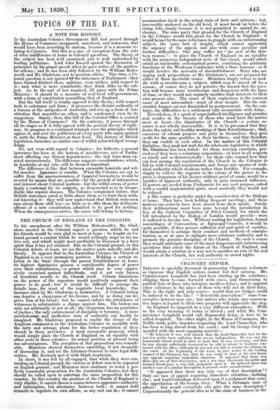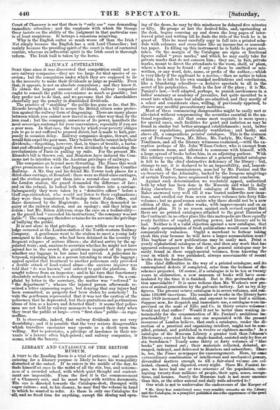CHANCERY REFORM.
IRRTAND is specially favoured in possessing Chancery reformers so vigorous that Elish suitors cannot but feel envious. Mr. Commissioner Longfield has just been stirring up the solicitors ; obliging them to come forward with cases, and threatening to publish lists of those who interpose needless delays, and to appoint other solicitors in the place of those who will not do their duty. This is the right and only course : would that our Judges could be induced to do the like ! " Detestable innovation !" some Con- servative lawyers may cry; but suitors who retain any conserva- tive hopes in regard to their own property will appreciate the step. In England we languish in a very different atmosphere. With us the very meaning of terms is altered ; and what Mr. Com- missioner Longfield would call disgraceful delay, is here to be called despatch. The other night, in the House of Commons, Mr. Baillie made polite inquiries respecting the Lord Chancellor, who has been so long absent from his court ; and Sir George Grey re- sponded with the most engaging naivete— "He believed it was well known that the Lord Chancellor had for the last few weeks been suffering from severe indisposition. He was sure his honourable friend would be glad to hear that he was recovering, and that he was already sufficiently recovered to be able to attend to butaness con- nected with his office, although he was not yet able to resume his sittings m the court. At the beginning of the term, he gave notice to the leading counsel of the Chancery bar, that he was ready to hear at his own house any appeals requiring immediate attention. It appeared that there was then only one of that description, and a few days afterwards his noble and learned friend gave a very able judgment upon it. He believed there was another case of a similar description at present under consideratton. "It appeared that there was only one of that description" ! Only one ease of appeal requiring immediate attention—nothing else ; and Lord Cottenham delivered upon it a judgment that earns the approbation of Sir George Grey. What a fortunate state of affairs! But would everybody else give the same description ? Unquestionably the general idea as to the state of business in the
Court of Chancery is not that there is "only one" ease demanding immediate attention ; and the emphasis with which Sir George Grey insists on the ability of the judgment in that particular case is at least suspicious. It betrays a conscious misgiving.
Why is the English suitor so much worse off than the Irish ? Not simply because the English has a sick Lord Chancellor; bet -mainly because the presiding spirit of the court is that of contented routine, whereas an influential spirit in the Irish court is thorough reform. The Irish bull is taken by the horns.



























 Previous page
Previous page